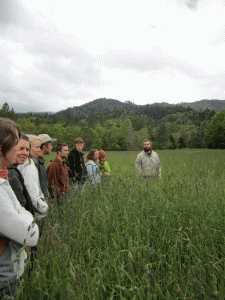Farm Corps Farms Next Internships For Beginning Farmers in Oregon
Host farmers are required to offer close supervision and mentoring to promote mastery of the basic skills needed to operate their farm. Interns are exposed to all aspects of the farm operation and develop skills throughout the growing season. In addition, each intern will be expected to keep a weekly journal on what they are learning and experiencing throughout the farm season. RFC and the Rogue Community College will evaluate the progress and success of each intern throughout the season.
The goal of the Farms Next internship program is to prepare beginning farmers and ranchers with the fundamental skills and concepts of operating a successful commercial farm. RFC’s Education Director will guide successful applicants through the process of enrollment and participation. Upon successful completion of the Farms Next internship program, student interns will receive a Certificate of Completion awarded by RFC, as well as the credits earned from the Rogue Community College.
Educational Components:
1. Field-based education and on-farm work experience (30-50 hours per week)
The majority of this program is focused on learning by doing, while under the supervision and mentorship of your host farmer. Participants will work both cooperatively and individually to accomplish the daily farm work. These tasks will vary according to each farm and it’s production methods. The number of hours worked each week will directly correlate to the number of credits earned through the Professional Training course at Rogue Community College. Students will keep a weekly journal and will be evaluated twice per season. A typical day on a vegetable farm might include any of the following and more: bed preparation, plant propagation, weeding, harvesting, running the market stand, or making compost.
2. Practical Skills Classes (Two-week intensive at beginning of the season, then two to three times a month)
Whole group classes and lectures, offered through the Rogue Farm Corps and the Oregon State University Extension’s Small Farms Program, provide the opportunity to disseminate core information and background for the skills being taught on the farm. Area farmers and agricultural professionals teach the classes, which are held in the classroom or on the farm, depending on the topic.
The curriculum includes the following topics: Biodynamics, Compost, Cover cropping, Crop rotation, Direct seeding, Entomology, Farmland conservation, Food and farm advocacy, Genetically modified organisms, Grazing systems, Greenhouse 101, Green manure, Harvesting, post-harvest handling and food safety, History of food and agriculture, Irrigation, Permaculture principles, Plant pathogens, Poultry management, Seed saving, Soil science and fertility, Tractor cultivation and implements, Transplanting, Weed management, Winter farming
3. Farm tours (2-3 times a month throughout the farming season)
Once the farming season is underway, students will have the opportunity to meet, observe, learn and potentially work with other farmers in the Rogue Valley. Farmers will lead a farm tour while incorporating time for questions, discussions, and demonstrations, allowing for students to have a more interactive learning experience. These farm tours and on-farm classes will expose the students to a number of different operations, techniques and farming styles.
4. Discussion Circles and Potlucks (4-5 times throughout the farming season)
Approximately once a month, we will hold informal discussion circles and potlucks on topics such as food and farm advocacy, agricultural politics, living rurally, and natural building. These evening get-togethers provide social interaction and an opportunity to talk about some of the other issues that are surrounding our food system and the way we live. They tend to be a lively and thought provoking way to spend an evening.
Program Details:
Internships Start: April to May
Internships End: October to November
Number of Interns accepted: 20
Application Deadline: March 15th, 2012 (early applications are encouraged to ensure placement)
Minimum Length of Stay: Varies from farm to farm.
Room and Board: Varies from farm to farm.
Skills Desired: Varies from farm to farm.
Stipend: Varies from farm to farm.
Tuition: The tuition cost for the full-time Farms Next internship program is approximately $3200. The tuition fee is directly associated with the amount of on-farm hours worked at each host farm, so the exact amount will vary from farm to farm. Rogue Farm Corps Education Director will work with you as an individual to guide you through this process. Tuition is due at the beginning of each term and a payment plan can be set up through the Rogue Community College.
Credits: Students will earn credits through the Professional Skills Training Course at the Rogue Community College. These credits can be applied towards an Associates Degrees or a Certificate Program at the Rogue Community College. Whether or not these credits transfer to another academic institution depends on that institution.
Rogue Farm Corps will assist in the recruitment and placement of interns on participating farms. Final hiring decisions are up to the individual farmers. Details of work expectations, living situations, stipends and other issues are worked out between individual farmers and interns.
You can expect to work hard and learn a lot. Our community has a vast array of small farms, from market vegetable fields to grass fed livestock, seed growing to commercial dairying, poultry to CSAs. As a participant in Farms Next, you will be exposed to all of these diverse offerings in our Southern Oregon community. To learn more about our host farms, please see our website at www.roguefarmcorps.org.







 Your Privacy Choices
Your Privacy Choices
Leave a comment